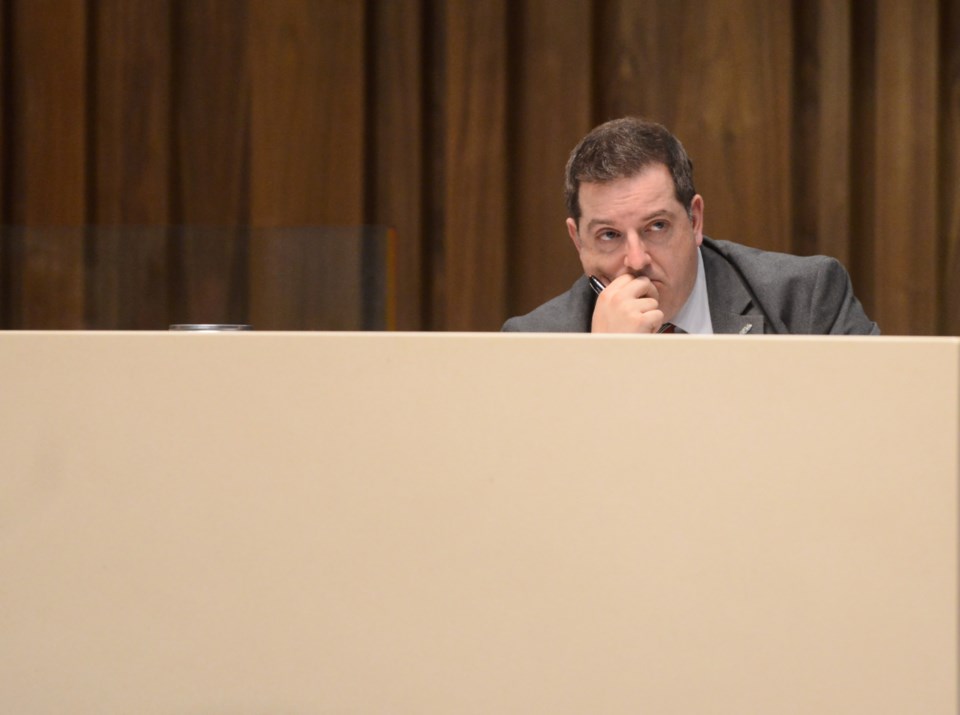It seemed appropriate that Monday’s six-hour Committee of the Whole meeting included a 90-minute discussion about how to make meetings shorter.
I’ve sat in enough long meetings to agree with the core thesis that there must surely be a way to keep meeting times to a length that doesn’t result in butt numbness. Having said that, a little butt numbness is a small sacrifice if the alternative is less democracy in our council chambers.
Now committee did make the right decision to defer the non-administrative changes to the procedural bylaw until the full review at the midpoint of the council term, but this is the third time a review of the bylaw has suggested, perhaps indirectly, that delegates are the reason some council meetings run so long.
Specifically, repeat delegates, people who come to committee and advocate on an issue and then come back to the regular meeting of council and delegate again on the same topic. Let’s call it “double dipping”, and it’s not actually a problem because City Clerk Stephen O’Brien admitted that it’s actually pretty rare that people double dip.
The problem, I suppose, is that double dipping happens when council has a contentious or controversial issue in front of it, and those tend to be longer meetings by their nature.
But is it council’s responsibility to govern the passion of its constituency? It is right to prioritize the timeliness of council meetings over the right of constituents to express themselves as many times as they want?
Also, why is the clerk’s office making more work for itself? If the change went through, the Clerk’s office would have to come up with a standard definition of “new information”, because the only way someone would be able to delegate twice under the proposed new rules is if they provide, or respond to, “new information”.
It also means proctoring delegations, having people submit their materials in advance to make sure that they’re bringing “new information”, which is not only an entirely new condition put on delegating, but also means that delegates essentially need the government’s approval in order to speak to their elected representatives.
Does that sound scary to you? It should.
Now, it was noted several times at the meeting that none of this was done nefariously, and I believe that, but what’s that they say about what the road to Hell is paved with?
I’ll leave that dangling and move on to say that none of the onus for meeting length in the staff report was put on council themselves, although a couple of councillors did rise in the meeting to note that their own long-windedness often contributes to meeting lengths.
The first step to finding a solution is admitting you have the problem, I guess.
If you’ve sat through enough council meetings, you see the trends. Sometimes a councillor asks a lot of questions because they see the chance to show off their advocacy on a given issue. Sometimes a councillor wants to prove that they did the homework, so to speak, by asking a lot of probing, technical questions.
It was asked in this committee meeting if there might be a way for councillors to ask their questions on a system similar to the budget message board, but it’s worth noting that not everyone has the same access to a computer and the internet to leisurely scroll through a Reddit-style thread of council queries.
Clerk O’Brien made the point that council delegation is actually an imperfect method of engagement because when something comes to council for approval, it’s at the end of the process, not the beginning. Fair, but you can’t deny the size of the stage; city council is Broadway, those initial town halls and open houses are akin to the test runs in Kansas City or St. Louis that the big Broadway musical do to work out the kinks.
Perhaps another option is to use that big stage more at the beginning, use the optional third Monday meeting as a kind of town hall to invite community input on pending projects.
It’s also an option to use that third Monday meeting to tackle specific council agenda items that we all know will get serious attention from the public. The September 16 meeting on the update to the Baker District Redevelopment is a good example of that.
Perhaps creating more time, is the only way to avoid having longer meetings, because it seems like the alternative is to have less democracy, and less engagement, and that shouldn’t be an option if the only reason to do it is to save time.
In the inspirational climactic scene of Mr. Smith Goes to Washington, the titular senator keeps fighting for what’s right even though the corrupted result seems inevitable, and even though all the appendages of the political machine have been used to undermine him and discredit him.
Jimmy Stewart’s the hero in that movie, and you’ll note that no one’s standing over him with an egg timer.
